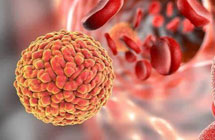研究:寨卡病毒或可治疗脑癌
The Zika virus can wreak havoc on the brain of a developing fetus, but its destructive power may also be harnessed to fight a stubborn form of adult brain cancer, researchers said.
研究人员近日称,虽然寨卡病毒会严重损害胎儿大脑,但其破坏性也可以被用来治疗一种顽固性成人脑癌。
Early studies have shown the mosquito-borne virus can destroy cells responsible for glioblastoma, the most common form of brain cancer.
早期研究发现,这种蚊传播的病毒可以破坏导致恶性胶质瘤的细胞,恶性胶质瘤是最常见的一种脑癌。
Glioblastoma affects 12,000 people per year in the United States, and was recently diagnosed in Senator John McCain.
美国每年有1.2万人患上恶性胶质瘤。最近美国参议员约翰-麦凯恩也被诊出患有此病。

The standard treatment is chemotherapy and radiation. But most patients die within two years.
恶性胶质瘤的标准治疗方法是化疗和放疗,但大多数病人生存期不足两年。
"It is so frustrating to treat a patient as aggressively as we know how, only to see his or her tumor recur a few months later," said Milan Chheda from Washington University School of Medicine.
华盛顿大学医学院的米兰•切赫达说:“我们想尽一切办法治疗病人,最后却发现病人的肿瘤几个月后就复发了,这真令人沮丧。”
"We wondered whether nature could provide a weapon to target the cells most likely responsible for this return."
“我们想知道大自然能否给我们一种武器,来对付最可能导致这种复发的细胞。”
The secret to Zika's apparent success, the latest experiments show, is that the virus specifically takes aim at brain cancer stem cells, the kind that tend to survive chemotherapy and spread.
最新研究表明,寨卡病毒实验取得明显成功的秘密在于,这种病毒会专门攻击脑癌干细胞。这种细胞往往能够在化疗中生存下来并继续扩散。
When a pregnant woman is infected with Zika, she faces a higher risk of bearing an infant with an unusually small head because Zika destroys these cells, leading to the irreversible condition known as microcephaly.
如果孕妇感染寨卡病毒,婴儿患小头症的风险会更高,因为寨卡病毒会破坏这些细胞,造成被称为小头畸形的不可逆损害。
Zika tends to attack neuroprogenitor cells, which are common in fetuses but rare in adults.
寨卡病毒倾向于攻击神经前体细胞,这种细胞在胎儿体内很常见,但在成人体内数量很少。
"We showed that Zika virus can kill the kind of glioblastoma cells that tend to be resistant to current treatments and lead to death," said study co-author Michael Diamond, a professor of medicine.
医学教授、研究论文共同作者迈克尔•戴蒙德说:“我们证实,寨卡病毒能够杀死可抵御现有治疗手段并导致患者死亡的胶质母细胞瘤细胞。”
Researchers injected either Zika virus or a saltwater placebo directly into the brain tumors of 33 mice, said the report in The Journal of Experimental Medicine.
发表在美国《实验医学杂志》期刊上的研究报告称,研究人员将寨卡病毒或盐水安慰剂直接注入33只小鼠的脑肿瘤中。
Two weeks later, "tumors were significantly smaller in the Zika-treated mice", the report said. These mice also survived "significantly longer than the ones given saltwater".
报告称,两周后,“注射寨卡病毒的小鼠的脑肿瘤小了很多”,其存活时间也比“注射盐水的小鼠长得多”。
More work is needed before the treatment can be safely attempted in humans.
报道称,还需要开展更多工作才能在人类患者身上安全地尝试这种疗法。
The virus would likely be injected directly into the brain during surgery to remove the primary tumor.
报道称,治疗时可能会在原发性肿瘤移除手术期间直接将寨卡病毒注入大脑。
Extra studies on Zika's effects on the brain tissue of epilepsy patients showed the virus did not infect noncancerous brain cells.
此外,分析寨卡病毒对癫痫患者脑组织影响的研究表明,这种病毒不会感染没有癌变的脑细胞。
"We see Zika one day being used in combination with current therapies to eradicate the whole tumor," Chheda said.
切赫达说:“我们认为,有朝一日会将寨卡病毒和现有疗法配合使用,从而根除恶性胶质瘤。”